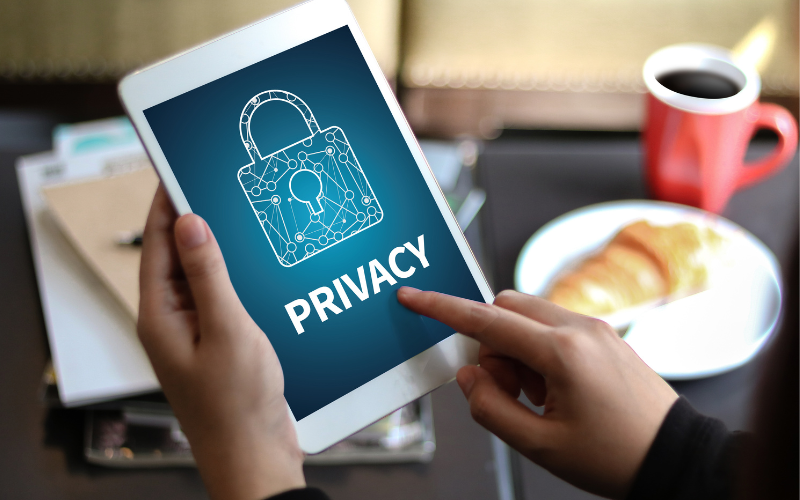Introduction
A Brief Overview Of The Increasing Importance Of Data Privacy In The Digital Era

Data privacy has emerged as a vital concern in the digital era, where data breaches and cyber attacks are becoming increasingly common. With the exponential growth of digital technologies and social media platforms, personal information has become more vulnerable than ever before. Companies collect vast amounts of user data for targeted advertising, but this practice can lead to personal information being mishandled or exploited.
Furthermore, with the rise of artificial intelligence (AI) and machine learning algorithms, there is an increasing need to protect sensitive data from unauthorized access or misuse. Data privacy regulations such as GDPR (General Data Protection Regulation) and CCPA (California Consumer Privacy Act) have been implemented to address these concerns. They aim to ensure that companies comply with strict rules on how they collect, store, and use personal data.
The Significance Of Understanding Data Privacy Violations
The significance of understanding data privacy violations lies in their impact on individuals and businesses alike. For individuals, data breaches can result in identity theft, financial losses, or exposure to sensitive information such as medical records and social security numbers. For businesses, these violations can lead to reputational damage and loss of customer trust.
Moreover, with the introduction of new regulations such as GDPR (General Data Protection Regulation) and CCPA (California Consumer Privacy Act), businesses are now required to take proactive measures to protect their customers’ personal data.
Understanding Data Privacy
Defining Data Privacy

Data privacy refers to the protection of sensitive or personal information from unauthorized access, use, or disclosure. The digital age has made data privacy a critical issue as more people are now connected to the internet and technology. With companies collecting and storing large amounts of personal data, there is a growing concern about how this data is being handled.
Data privacy includes ensuring that individuals have control over their personal information and consent to its use. It also involves making sure that collected data is secure from cyber-attacks and breaches. Data privacy laws exist in many countries, such as the General Data Protection Regulation (GDPR) in Europe and the California Consumer Privacy Act (CCPA) in the United States.
Importance of Data Privacy
Data privacy is an essential aspect of our digital lives. With the increasing amount of data shared and stored online, protecting personal information has become more critical than ever. Data breaches and cyber-attacks have become prevalent in recent years, exposing sensitive information such as credit card details, social security numbers, and personal addresses.
Apart from the financial implications of data breaches, there are also reputational damages that individuals and companies can suffer. The exposure of private information can result in a loss of trust among customers or clients, leading to a damaged reputation for businesses. Furthermore, data misuse can result in identity theft, discrimination or harassment based on personal characteristics such as race or gender.
There is also growing concern about how companies handle user data in terms of tracking and profiling individuals for targeted advertising purposes. This has led to a demand for transparency around how companies collect and use consumer data.
Types of Data Privacy Violations
Unauthorized Data Collection
Unauthorized data collection has been a persistent issue in the digital world, with companies often engaging in tracking user behavior without consent. Websites and applications can use various methods to monitor user activity including cookies, web beacons, and device fingerprinting. This type of data collection can result in targeted advertising or even the sale of personal information to third-party advertisers.
Another way that personal information is harvested without consent is through social media platforms. With approximately 3 billion active users worldwide, social media has become a treasure trove for cybercriminals looking to collect sensitive data such as names, addresses, phone numbers, and email addresses. Social media platforms have also been known to collect additional data such as search history, location data, and even biometric information without user knowledge or permission.
Data Breaches

These incidents happen when sensitive, confidential, or protected data is accessed, stolen, or used without authorization. Data breaches can occur due to various reasons such as hacking, phishing attacks, malware and ransomware attacks, employee negligence, or errors.
Some of the major data breach incidents that have occurred in recent years include the Equifax data breach that affected over 147 million people’s personal information including social security numbers and addresses. The Marriott International hotel chain also suffered a massive data breach affecting up to 500 million guests’ information. Another significant incident was the Yahoo! breach where hackers stole personal information from all three billion user accounts.
The effects of these breaches are severe for both individuals and companies alike with consequences like financial loss, reputation damage, and identity theft among others.
Inadequate Consent Practices
One of the biggest problems is that people are often not given a clear understanding of what they’re consenting to when it comes to sharing their data. In many cases, companies use vague or confusing language that makes it difficult for users to know exactly what they’re agreeing to.
The implications of vague consent terms can be far-reaching and severe. For example, if a user agrees to share their location data with an app but doesn’t realize that this also means the app has access to their contacts and camera, this could lead to serious privacy violations down the line. Similarly, if someone agrees to let an advertising company track their internet activity but doesn’t realize that this includes monitoring all of their search history and emails, they could be unwittingly exposing themselves to invasive marketing tactics.
Implications of Data Privacy Violations
Personal Consequences
Identity theft and financial fraud are two of the most devastating personal consequences of data privacy violations in the digital age. Personal information, such as login credentials and banking details, can be easily accessed by hackers who use it to steal money or make unauthorized purchases. Victims of financial fraud often face a long and challenging process to recover their stolen assets, which may have significant short-term and long-term implications on their personal lives.
Apart from financial losses, data privacy violations can also cause severe psychological impacts on individuals. Victims of identity theft may feel violated and vulnerable, with a sense that their trust has been betrayed. They may suffer from anxiety, depression, or even post-traumatic stress disorder (PTSD), particularly if they have experienced multiple instances of identity theft or cyberbullying. In some cases, individuals may withdraw from social interactions or become paranoid about sharing their personal information online.
Societal Consequences
One of the most significant impacts is the manipulation of public opinion through targeted advertising and misinformation campaigns. By collecting massive amounts of personal data, companies can create highly accurate profiles of individuals and use this information to influence their beliefs, attitudes, and behaviors. This can have serious implications for democratic processes and social harmony.
Another consequence of data privacy violations is discrimination and bias in decision-making. Algorithms used by companies to make decisions about credit scores, job opportunities, or insurance premiums are often trained on biased data sets that reflect existing social inequalities. As a result, these algorithms perpetuate rather than reduce discrimination against marginalized groups such as people of color or those with disabilities.
Legal and Ethical Perspectives
From a legal standpoint, data privacy violations can have serious consequences for businesses. Many countries have specific laws in place to protect consumer data, such as the European Union’s General Data Protection Regulation (GDPR) and the United States California Consumer Privacy Act (CCPA). Failure to comply with these regulations can result in hefty fines and legal action from affected individuals. It is essential for companies to prioritize data privacy compliance measures, including proper handling and storage of sensitive information.
Ethical Considerations
When discussing the ethical implications of data privacy violations, it is essential to consider not just the immediate impact but also the long-term effects on individuals and society at large. Violations can erode trust in companies, undermine confidence in institutions, and ultimately harm economic growth. Moreover, as technology continues to advance at an unprecedented pace, it is imperative that companies prioritize data protection measures and implement robust security protocols.
Companies and individuals must recognize their role in protecting sensitive information. Organizations must take proactive steps to safeguard customer data by investing in cybersecurity measures, conducting regular audits, and ensuring compliance with industry standards. Similarly, individuals need to be mindful of their own online behavior – avoiding risky practices such as sharing passwords or using unsecured networks – while holding companies accountable for any lapses in security that could put their personal information at risk.
Protecting Data Privacy
Personal Data Protection Measures

Individuals should take necessary measures to protect their privacy online. One tip for protecting personal data is to avoid sharing sensitive information on public networks or public computers. Additionally, it is crucial to keep software and antivirus programs up-to-date to prevent any potential threats.
Another crucial aspect of personal data protection involves using strong passwords and encryption methods. Strong passwords that comprise a combination of letters, numbers, and special characters can help prevent unauthorized access to an individual’s accounts or devices. Encryption methods further enhance security by converting sensitive information into a coded language that cannot be easily deciphered by hackers or cybercriminals.
Organizational Data Protection Practices
It is crucial to have a written policy in place that outlines how sensitive data will be protected. The policy should cover topics such as access control, encryption, and data retention periods. It should also detail procedures for reporting breaches and provide clear guidelines on what to do when a breach occurs.
Additionally, training employees on data privacy best practices is vital to prevent accidental or intentional violations of organizational data protection policies. Employees should receive regular training sessions that highlight the importance of handling data securely, identifying phishing attacks, and knowing how to report suspicious activities. They should also be educated on password management practices and the dangers of sharing sensitive information with unauthorized individuals.
Organizations need to prioritize both implementing robust data protection policies and regularly educating their employees about best practices for maintaining data privacy. Doing so can help mitigate risk exposure from potential cyber threats while also fostering a culture where protecting personal information is seen as a collective responsibility across all departments within the organization.
VII. Conclusion
Data privacy violations are not a new phenomenon in the digital age. However, with the increasing reliance on technology, there has been an exponential increase in these violations. Companies collect massive amounts of data from their users without their knowledge and consent, and this information is often used for targeted advertising or sold to third parties.
It is important to note that data privacy violations have serious consequences that can impact individuals and society as a whole. From identity theft to election interference, the misuse of personal information can have far-reaching consequences. Therefore, it is imperative that individuals take steps to protect their digital footprint by being mindful of what they share online and using tools such as VPNs and encryption.
FAQs
What Are The Legal Consequences Of Data Privacy Violations?
Data privacy violations can have severe legal consequences for individuals and organizations. In many countries, data protection laws govern the collection, use, storage, and sharing of personal information by businesses and government agencies. Violating these laws can lead to serious penalties such as fines, lawsuits, or even criminal charges.
In some cases, data breaches may result in class action lawsuits where a group of people affected by the breach files a lawsuit against the company responsible for their personal information being exposed. These cases can lead to significant damages awards which could bankrupt smaller companies.
Additionally, regulatory authorities like the General Data Protection Regulation (GDPR) in Europe have broad powers to enforce compliance with data protection regulations. Companies that violate GDPR may face fines of up to 4% of their global annual revenue or €20 million (whichever is higher).
What Is The Role Of Technology In Data Privacy Violations?
One of the primary roles of technology in data privacy violations is that it provides an avenue for accessing sensitive information. In most cases, hackers use malware, phishing emails, and other forms of social engineering tactics to gain access to personal devices or networks.
Technology also plays a role in how companies collect and store data. Many organizations rely on databases and cloud storage systems to store customer information. A breach in a company’s digital infrastructure can result in the loss of terabytes of sensitive data such as credit card numbers and social security details.
Technology is also used by companies to track user behavior online through cookies and other tracking mechanisms. This type of tracking raises questions about how much personal information should be collected without consent from users.
How Can Data Privacy Impact Society As A Whole?
One potential impact of data privacy violations is a loss of trust in institutions that collect and store personal data. If people do not believe that their personal information is being handled responsibly, they may be less likely to share it with organizations in the future. This could have negative implications for businesses looking to collect customer information or governments trying to gather census data.
Another potential impact of data privacy violations is the increased risk of identity theft and other forms of cybercrime. When personal information such as social security numbers or credit card details is stolen or leaked online, individuals may become vulnerable to fraudsters seeking to exploit this information for financial gain. This can have significant financial consequences for both individuals and society as a whole if large-scale breaches occur.
Are There Any International Efforts To Address Data Privacy Concerns?
International efforts have been made to address data privacy concerns, and one such effort is the General Data Protection Regulation (GDPR) enforced by the European Union (EU). The GDPR came into effect on May 25, 2018, and it aims to protect EU citizens’ personal data by providing a framework for businesses that handle personal information. The regulation has strict rules on how companies collect, store, process, and transfer personal data.
Another international effort is the Asia-Pacific Economic Cooperation’s (APEC) Cross-Border Privacy Rules (CBPR) system which provides a mechanism for businesses across APEC economies to demonstrate their compliance with privacy laws. It sets out specific requirements for privacy policies and practices that make up an accountable program for the protection of personal information.
Policymakers around the world are exploring other ways of addressing data privacy violations in the digital age. Efforts such as introducing new legislation or updating existing ones are being made in countries like Brazil, Canada, India, Japan, and South Korea among others.
